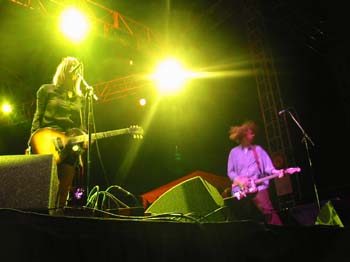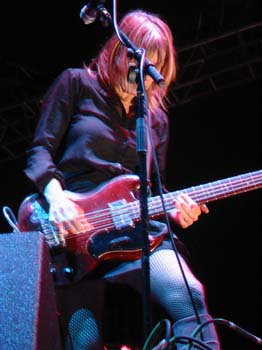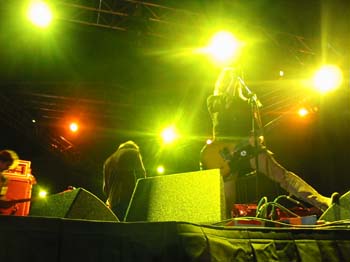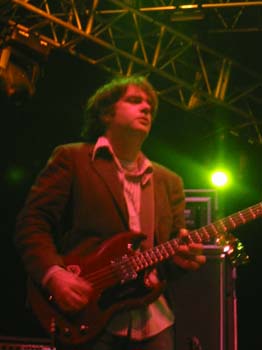All Tomorrow's Parties - Sonic Youth
back to ATP festival index

Sam Frank: Sonic Youth concluded Saturday with their by-now standard set of noise pop and pop noise. I like Jim O’Rourke’s contribution; Ben doesn’t—in either case, he gives them one more particle to orbit Steve Shelley, now more than ever the nucleus, as SY spreads the stage against rock hierarchy, jams out in space as well as time. Was the set good? Sure, insofar as it again defined the precondition for an interesting rock band working today: a productive tension between sound and structure, freedom and form. Modest Mouse and Built to Spill preceded SY, and, while I have nothing against them, is there a single reason to get excited about what they do, have done, and will do? No. It’s fun to bemoan SY’s profligacy, some say dilettantism—but then again, how many other bands have helped so many, for so long, locate rock’s place in the world of music and the universe of sound? The Beatles? Eno? Radiohead? Andrew WK?
Ben Tausig: I liked their set, partially because it was so long. They had the chance to spread out, to play noise between and around their “pop” songs rather than having to condense their improvising into one part of the evening, and they took advantage.
Outside of his studio contributions, I have trouble hearing what O’Rourke adds to the band. It seems like most of his parts could be replaced by Thurston adding a pedal or two.
It isn’t worth dwelling on too much, however, because Sonic Youth reminded the audience why they remain indie rock’s most authoritative group. As ever, they seem intrigued by new music, and willing to integrate ideas that they like. Only now, they do so with twenty years of history. None of which is to say that Sonic Youth have moved beyond reproach, but they are exciting to watch, and they still illustrate a large part of the present state of guitar music. More to the point, Thurston stood in the crowd during other bands’ sets.

We talked to Lee Ranaldo after the Watt-Hurley Minutemen duet.
SF: What’d you think of the Minutemen—I mean, not really the Minutemen?
LR: Yeah, it was the Minutemen duo, that’s what it’s billed as. It was amazing. I really loved it. I saw them a whole bunch, I’m happy to say, back in the day, and was friends with them all from back that time. It was very moving to see them do it. You could almost feel this shivering air over on stage-left, where D. Boon was supposed to be, and you could kind of hear his guitar parts and everything. It was really a very brave thing for them to do. Very moving. I really loved it. I thought it was amazing.
SF: You’re playing real soon?
LR: We’re playing in about an hour and a half.
BT: Any particular plan for the show tonight?
LR: We’re playing four new songs that are gonna be on our new album, three of which have only been played once before, last week, in a little tiny club for 75 people in Massachusetts. So that’s one of the exciting things—that we’re going to premiere, basically premiere, three new songs, and one other one that we’ve been playing a little bit the last year. That’s a lot of the fun of it for us. And then we’ll do a selection, we’ll do some Murray Street stuff and a few oldies and different things.
SF: It seems like by now, festivals like this, Sonic Youth are going to headline.
LR: Not necessarily. We don’t always headline these kind of festivals. These days, more and more of the headliners—this one is a cooler festival than most, so maybe we’re up there—there’s all these modern rock bands that headline these days. But whatever, it doesn’t bother us; we like to play. It doesn’t really matter to us whether we’re the headliner or not, in terms of prestige or whatever. We know what we are. We’re not too worried about it.

SF: You’ve already got your one lifetime Simpsons appearance, right?
LR: Yes.
SF: Can you ever go back, or is it not allowed?
LR: I don’t know. It was really cool—Matt made a special print for all the artists on this weekend, and signed each one of them personally—“To Lee, from Matt Groening”—drew a little Bart, a print of the LA Weekly cover [a drawing of a band on stage, with two men, a brown-haired shaggy guitarist and a black-haired overbiting drummer, and one woman, a blond-haired, skirted bassist, on stage and a pair of hairy legs protruding from the right]—which I’m told is actually us. I guess that’s my feet sticking out of the corner there—
SF: Or Jim O’Rourke’s. You might have to fight. There’s a different feel to this one. You had Dead C…
LR: That’s what comes when you have a different person curating it, and that’s the cool thing about having different curators do it. Ours was a little bit more noisy and eclectic, probably, and also the settings were so different. We had a small room where we could have some really intimate noisy things; it was all interior spaces and whatnot. So it was a different kind of vibe.
SF: Are you doing Text of Light, or is that you and some friends?
LR: It’s mainly a project of me and this other New York guitar player, Alan Licht.
SF: And you perform to [filmmaker Stan] Brakhage stuff?
LR: Yeah. It’s a group, though, it’s really a set group. It’s me and Alan on guitars, it’s either Christian Marclay or DJ Olive on turntables, or sometimes both, it’s either William Hooker or Tim Barnes on drums, and a sax player named Uli Krieger from Berlin.
SF: Are you playing off the projection? Or just playing improvisation?
LR: We’re not illustrating the projections. They’re happening and we’re happening at the same time.
SF: A [John] Cage-[Merce] Cunningham thing?
LR: Yeah, it’s more like that. We’ve been doing it a bunch. I just, two nights ago, was in the studio working on recordings. We’ve got two or three different releases coming up soon, a couple vinyl things and a CD thing. We’re doing a show at the Walker Arts Center in Minneapolis in February and somewhere in Pittsburgh next week, a film festival. We did a couple European tours. Haven’t been out here yet. It’s a cool group, that’s for sure.
SF: Did you know Brakhage when he was alive?
LR: I saw him talk a couple times and met him once. I studied with a lot of his peers. When I was in college I studied with a lot of American avant-garde film people, in particular Ken Jacobs. I still know him very well.
SF: Did you go see his Star Spangled to Death? They just played it at the Walter Reade [in NYC—it was the six-hour-plus premiere of the finished version of the film Jacobs has been working on for half a century, an intentionally lumpy masterpiece of repressed American imagery that should eventually end up on DVD—SF].
LR: I didn’t see it recently, but I have seen it. I’ve seen most all of his stuff. He was my teacher for three or four years, and he had Brakhage come through and Jonas [Mekas] and all these other people from that period: Hollis Frampton, Ernie Gehr. Another guy, a little lesser light, Larry Gottheim, was another teacher at the school. I did a bunch off film work at the time. SUNY Binghampton. I just saw Ken on the street a week ago. We still talk. My wife does film work—she’s the only other person I know who works with those analytical projectors that Ken uses. To very different ends, but whenever they meet, they’re talking about the technical stuff.
We’ve been using Harry Smith films, the Whitney brothers, Piero Heliczer, and Tony Conrad’s The Flicker.
SF: Do you have any films yourself that circulate?
LR: I’ve got a bunch, but I wouldn’t say that any of them really circulate.
SF: Does Anthology [Film Archives, in New York, which stores and screens experimental films] have a copy?
LR: No, they don’t, actually. That may change sometime soon. But a couple of them are coming out on DVD, reissue from this company in Chicago called Atavistic that put out these two video compilations in the late ’80s, each of which had a work of mine. One was a video work; the other was actually a Super-8 film, like a tour film kind of diary thing. We’re talking about doing a whole DVD of all my stuff. I just in the last year or so started actively making films and video stuff again, and learning Final Cut and all that kind of stuff. I’ve got these three artworks in a museum show right now in Vienna that are built out of old acoustic guitars with little tiny video monitors in the sound-holes, so I edited a bunch of different film footage for those.
SF: Any contemporary people you like?
LR: There are two or three Germans. They’re hand-processing, treating films with molds, burying them in the ground for a month. In New York, Bradley Eros and Collective Unconscious. I really liked what Sadie Benning was doing with the pixel camera. I made a bunch of pixel camera movies myself, actually.

SF: What do you think about being The Band That Keeps Up With What’s New? Is it willful energy, or is it just that you all stay interested?
LR: It’s both. A lot of artists, as they get real established in their careers, tend to turn inward and got self-involved. For us, half the fun is having a big peer group and being really interested in what other people are doing. And that’s inspiring. We are totally interested in what younger people are doing, and other musicians, young or old: Magic Band.
BT: What’d you think of their set?
LR: I was super-happy to see them. I didn’t take it as being one of the more together sets they’d probably ever done, and Jim, who’s seen the other one they did in England, said that it was a much more together set. I still thought it was really phenomenal and I really liked it. It felt a little raggedy, but I didn’t care. It was still better than 60 percent of what you see, at least.
BT: What’d you think of John French singing?
LR: I thought he was good. I wasn’t sure what I’d make of it before, because I’d heard about it and I wasn’t sure if I was going to feel that “Oh, he’s just copying Beefheart.” But I didn’t feel like that; I felt more like they’re cut from the same cloth, they went through all the stuff together.
BT: He’s apparently writing a book about Don.
LR: I’ve read excerpts from it. It seems like it’ll be really good.
< Spoon | Liarbird >
By Dusted Magazine
|







